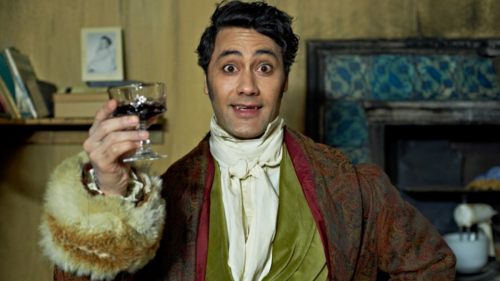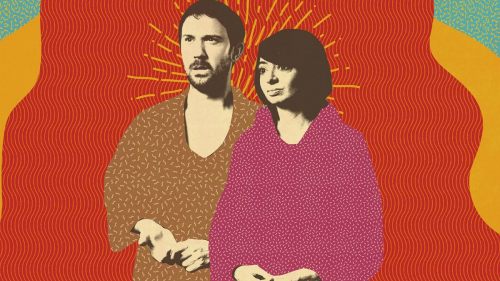The Backwards Coming-Of-Age Of JOJO RABBIT
This article contains spoilers for Jojo Rabbit.
In Jojo Rabbit, the Hitler Youth is not depicted as the monstrous brainwashing initiative it was designed as. Rather, it’s depicted as the fun, Scouts-like youth programme it was sold as - depicted, crucially, through the eyes of one of its members. That makes for a quietly, satirically chilling dramatisation of the indoctrination process, but it also turns the movie into an unusual coming-of-age story: a story in which the protagonist comes of age in reverse.
In the eyes of young Jojo (Roman Griffin Davis), the Hitler Youth is a chance to have fun with other kids. They do outdoor activities (grenade drills), they light bonfires (to burn books), they go on camping trips (more or less regular camping). Even the stories they tell each other about Jews are fun for the kids: they're campfire stories, essentially, each child one-upping the last, inevitably resulting in wild tales of fantastical monsters. It is through that sense of fun that the Hitler Youth programme sank its hateful teeth into still-forming minds, and I've never seen that point made as clearly as in Jojo Rabbit.
Director Taika Waititi knowingly frames all this with the charming, good-natured innocence of a Wes Anderson film, shooting weapon tests as comic tableaus and book-burnings as slow-motion frolicking. These small children aren't racist (just “off to a good start”); they’re just playing in the way they’re taught to play. Jojo’s imaginary friend Adolf Hitler (a Taika Waititi performance that doesn't quite gel with the rest of the film), too, is absolutely the image of Hitler a young boy in Nazi Germany might form: a cool famous guy in a snappy uniform with whom Jojo will totally one day get to be best friends. He knows no better, and it is through filling hungry young head-vacuums that a generation can get brainwashed.
Paradoxically, the Hitler Youth also attempts to instil a sense of manhood in Jojo and friends. These childhood activities are framed through Nazism, the children simultaneously forming loyalty to the German State. Preying upon children’s desire to be grown-up, youth group captain Klenzendorf (Sam Rockwell) teaches the boys to carry knives; to perform combat manoeuvres; to rat out subversion towards the state. They're taught to be Real German Men, in other words, even as the methodology leans towards child-friendly activities. It’s no accident that imaginary Hitler constantly offers Jojo cigarettes: a classic signifier of peer pressure, adulthood, and addiction.
As bemoaned by Jojo’s mother Rosie (Scarlett Johansson), this kind of carry-on rapidly steals childhoods. It’s all Rosie can do to offer her son an alternative - an alternative based around play-acting and dance - but her more clandestine political resistance flies under Jojo’s radar. More relatable is the alternative presented by Elsa (Thomasin McKenzie), the Jewish girl secreted away in the walls of their house. Turning potentially fatal interactions into games, Elsa teases out Jojo’s inner child, saving not just her own skin, but Jojo’s soul.
Elsa tells Jojo fancifully dastardly stories about her people, and Jojo tells her fanciful stories of her absent (later revealed to be dead) boyfriend via made-up letters. As they play each other’s games - a strong way to get to know people! - Jojo begins to see through the rhetoric being fed to him by the Nazis. The notion of an indoctrinated young Nazi being saved by a “good Jew” might seem trite, but similar processes are common even today amongst people who get deprogrammed out of hate groups. Getting to know those you’re told to hate, in the absence of the people telling you to do so, can be a powerful thing.
Throughout the film, Jojo’s allegiances become conflicted and torn, but the crucial point of change comes when he uses his Hitler Youth knife stab Elsa in the chest, drawing blood. It’s a shocking moment, and it needs to be, in order to take Nazism out of fantasy and into reality. Shit gets real, to quote another Waititi film. “The Jews” get real, in the form of Elsa; the Nazi state gets real, in its execution of Rosie; wargames get real, as the Allies reach Jojo’s hometown; and Hitler gets real, rendered fallible upon Jojo learning of his suicide. The horrors of the Nazi regime (though not all; Jojo never learns of the Holocaust) come home to roost in Jojo Rabbit's third act. He is now A Man.
Or is he? In most coming of age stories, Jojo’s epiphanies would manifest in his taking a step towards adulthood, but Jojo does the opposite. The Hitler Youth tells Jojo that he's a full grown man, inasmuch as he can serve as a loyal soldier. Far from becoming even more hardened through his subsequent learnings, though, Jojo reclaims his childhood. He's seen some shit, yes, but rather than losing his innocence, he rediscovers its value. All the kindness and frivolity the Hitler Youth taught him to hate about himself and others, he realises, didn't make him the weakling inferred by his nickname - they just made him a human being, and especially, a kid.
Jojo opens the film by telling us his age. He closes it out doing the same thing. At the beginning, he's ten years old. By the end, he's only aged six months, but his place in childhood has changed dramatically. It’s important for us to remember that Jojo still has several childhood years ahead of him, and with the film finishing on him and Elsa dancing in the street, it seems he'll get to live them like a proper kid. The Hitler Youth may have exploited his and other childrens’ insecurities about being children, but pliable minds can be plied back again, too. Faced with actual humanity, there’s hope for the boy yet.
Is that a little sentimental? Sure. But in our age of fascism re-ascendant, sentiment might be one of our most valuable weapons.


